
Trump Organization executives spent years making deals while having no reason to imagine that they would ever face scrutiny. What e-mails and documents are out there for Mueller to find?
Photograph by Patrick Fallon / ZUMA Wire / Alamy
Earlier this week, the Washington Post reported that Paul Manafort, when he was running Donald Trump’s campaign last year, sought to use his position to curry favor with Oleg Deripaska, a Russian oligarch close to the Kremlin. Manafort also, it appears, considered the campaign an opportune time to try to convince unnamed people who owed him money to finally pay him back. In response to this news, Ty Cobb, the White House lawyer in charge of representing President Trump in matters related to the Russia investigation, told Bloomberg’s Margaret Talev, “It would be truly shocking” if Manafort “tried to monetize his relationship with the President.”
Cobb’s shock is, surely, of the “Casablanca” variety. Manafort’s personal profit-seeking is, if anything, a rather tepid example of the kind of activity that the special counsel, Robert Mueller, might find as he continues to investigate those in Trump’s orbit. I have been reporting on the Trump Organization for the past year, and, the more work I’ve done, the more it has become clear that allowing hangers-on to monetize their relationship with him was, essentially, Trump’s business model.
The Trump Organization, as it has been described to me by more than a dozen people who have worked for it, was nothing like a typical, hierarchical corporation. The company’s central office was tiny and comprised a few dozen people, including Trump, his children, and some close associates, whose collective experience was largely limited to New York, Miami, and a few other American cities. When the company began aggressively pursuing international deals, over the past decade, it relied on a loose grouping of people who were authorized—formally or not—to travel around the world seeking deals in Trump’s name. Pocketing a little for themselves on the side was part of the arrangement.
According to the sources I’ve spoken with, the Trump Organization was shockingly lax in its due-diligence procedures. It seemed willing to do business with pretty much anybody, no matter his background. (Several Trump officials told me the key criterion was insuring that the potential partner could pay.) This was how Trump ended up doing business with the Mammadov family, in Azerbaijan, for example, whose members were publicly suspected by U.S. officials of partnering with a likely front company for the Iranian Revolutionary Guard. A Trump project in Georgia was undertaken with a company that had become entangled in one of the greatest bank frauds in history. A Trump partner in Indonesia, Hary Tanoesoedibjo, has been investigated for corruptionand for ties to violent and anti-American Islamists. The list could go on.
Manafort was a central figure in Trump’s world for only a few months. Mueller has been interested enough in him to take the extraordinary step of convincing a judge to authorize a “no knock” warrant, allowing F.B.I. agents to raid Manafort’s home in search of documents and other evidence. Typically, complex white-collar investigations begin with the arrests of the people whose possible crimes are easiest to prove and who seem most likely to “flip” and testify against higher-up figures.
A handful of Trump Organization executives—including Trump’s own children, Michael Cohen, who is now Trump’s private attorney, and Jason Greenblatt, who is now a White House official advising on the Middle East—spent many years making deals while having no reason to imagine that they would ever face the kind of scrutiny they are currently under. What e-mails and other documents are out there for Mueller to find? What financial records exist that disclose the flow of funds into the Trump Organization? Given their surprising connections to people likely to be actively working with the Kremlin, the Iranian Revolutionary Guard, and others hostile to the interests of the United States, what intelligence recordings are there?
One of Trump’s lawyers, Jay Sekulow, told me recently that he believes that Mueller is not authorized to investigate Trump’s private businesses or any dealings outside of Russia. He and the rest of Trump’s legal team surely hope that Mueller’s targeting of Manafort ends there. After all, Manafort ran Trump’s campaign and had known connections to Russian figures, and Mueller is looking for evidence of Russian meddling in the election. But there is much evidence to suggest the opposite—that this is no ending, just a beginning. Trump himself has made little distinction between his business and his political career. Cohen, for example, sought to enlist Vladimir Putin’s office’s help in developing a Trump Tower Moscow in 2016, just before the start of the primary season. It is inconceivable that everyone involved in foreign deals at the Trump Organization will not also be aggressively investigated. It also would be consistent with investigative best practices for Mueller to build toward those core figures by compiling a complete picture from people with less loyalty to the President, and for him to approach the core targets only once he is armed with ample evidence of any possible wrongdoing.
It should shock nobody, least of all Trump’s own lawyer, that people close to the President tried to monetize their relationship with him. There are dozens of people who could fit this description. Every single one of them, surely, is looking at the news about Manafort being woken up by F.B.I. agents rushing into his bedroom. His past dealings are being publicized all over the world; his future is on the line. Mueller is showing all these people the harder way to do things. Surely, they realize that there is also an easier way: they can proactively volunteer information to assist Mueller in his investigation.
[“Source-newyorker”]